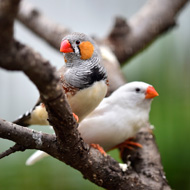Research reveals embryonic hearing abilities in birds

The 600 hours of recordings revealed that calling was triggered by temperatures reaching 26 degrees and above.
A paper published by researchers at Deakin's Centre for Integrative Ecology (CIE) details how birds use specific calls to warn incubating embryos about the heat.
The study, which has been published in the latest edition of Science, revealed how heat-warning calls changed post-hatching weight gain and behaviour in response to warmer temperatures in zebra finches.
Professor Kate Buchanan, Australian Research Council Future Fellow, said: "Embryos' capacity to hear and even learn, external sounds has been known since the 1960s, in humans and animals alike, but the implications of hearing before birth for adaptation to post hatching conditions has not been suspected."
The researchers used small microphones to record zebra finches breeding in outdoor aviaries at Deakin. The recordings were then played to eggs in artificial incubators. The 600 hours of recordings revealed that calling was triggered by temperatures reaching 26 degrees and above.
The specific call also changed how nestlings adjusted behaviour and growth to adapt to the heat. Calling also only occurred within five days of hatching, when it is assumed embryos develop hearing. The finches did not call to freshly laid eggs.
Adult finches that had experienced the calls demonstrated higher thermal preferences, choosing themselves to breed in hotter nests.
Lead author, Dr Mylene Mariette, said: "Such profound and long lasting effects of prenatal acoustic experience had never been demonstrated before."
"Our priority is to establish the physiological mechanisms underlying these effects and how widespread this strategy is in birds."



 The Kennel Club is inviting dog owners to attend a free webinar on gastric dilation-volvulus syndrome, also known as bloat.
The Kennel Club is inviting dog owners to attend a free webinar on gastric dilation-volvulus syndrome, also known as bloat.